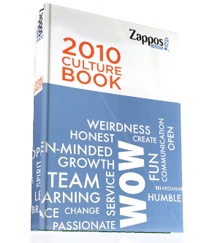 Tony Hsieh once said if you get the culture of a company right, “most of the other stuff will take care of itself”. While a great company culture can’t compensate for a failing business strategy or lack of demand for your company’s product, it can certainly be the key differentiator in attracting and retaining exceptional talent. Especially in today’s startup job market, company culture has become the new killer recruiting tool among savvy hiring managers. All other hiring factors being equal (such as great product/technology, compensation/benefits, fit for position/experience, etc.), having an exceptional and positive company culture can be the defining reason why people choose to join your company over someone else’s.
Tony Hsieh once said if you get the culture of a company right, “most of the other stuff will take care of itself”. While a great company culture can’t compensate for a failing business strategy or lack of demand for your company’s product, it can certainly be the key differentiator in attracting and retaining exceptional talent. Especially in today’s startup job market, company culture has become the new killer recruiting tool among savvy hiring managers. All other hiring factors being equal (such as great product/technology, compensation/benefits, fit for position/experience, etc.), having an exceptional and positive company culture can be the defining reason why people choose to join your company over someone else’s.
What is company culture, anyway? It’s defined as the external expression of a company’s shared values and behaviors. It includes how people act toward each other, how management treats customers and employees, along with the visible symbols displayed on the office walls. It includes both the obvious and not-so-obvious ways a company gets things done (or doesn’t). Culture is not a word statement written by human resources. Company culture may differ greatly from the ‘published culture’ contained in the recruiting brochure. Company culture drives employee and customer retention, productivity and morale, and can be the differentiating factor in a company’s success.
How Zappos Delivers Happiness through Culture
While listening to Tony’s ‘Delivering Happiness’ talk yesterday, I was impressed by how seriously Zappos walks the talk when it comes to making culture the #1 priority. Tony talked about creating ‘committable core values’ that the company is willing to hire and fire by. During new hire training, Zappos gives employees a $2,000 offer to leave the company to make sure only the committed stay on. Not only does the company embrace social media tools like Twitter as a way to build and promote Zappos culture, but it does not have a formal social media policy to police employees, trusting instead in their ability to do the right thing (my friend in the legal department confirms this is true).
Zappos encourages the sharing of information by embracing a culture of transparency, inviting anyone outside the company to request a copy of the Zappos Culture Book, packed with each employee’s idea about culture, the Zappos Core Values, and photos. It’s an effective and transparent recruiting tool for attracting new talent, in addition to the Zappos Insight tours hosted weekly at the company’s headquarters. Tony even invited participants to join the company’s next all-hands meeting to feel firsthand what it’s like to work there, mingle with employees socially and see the culture in action. (It’s Wednesday, August 9th and you can confirm an invite by emailing ceo@zappos.com). If you can’t make it to the all-hands, I suggest you check out a Zappos Insights tour or training event by emailing the Zappos Insights Team support@zapposinsights.com.
Define Your Culture, Then Recruit for Cultural Fit
In addition to owning several small businesses, I’ve also worked for over a dozen startups and companies since moving to Silicon Valley in the mid-90’s. I’ve experienced my share of both incredibly amazing cultures and semi dysfunctional company cultures. My experience has taught me that it’s always in the employer’s and employees’ best interests to be transparent about what a company’s culture is truly like.
As Tony Hsieh explained in his Delivering Happiness talk, it doesn’t really matter what the company’s values and culture are, as long as they are committable and communicated with transparency. The message to employees and to potential hires should always be, ‘This is who we are, this is what we care about, and you’re either on board with that or you’re not a fit.” If you can’t even answer #1 and #2, then there’s no way you can credibly convince people to do #3! Your culture statement could even be as simple as ‘We care about making money, we don’t care about culture’ and you will be sure to attract the right people to join your cause, and that’s okay!
I’ve had the honor of working with some visionary founders, including Tony Hsieh, Ali Partovi, and Bill Nguyen. These entrepreneurs all have the gift of smart recruiting through company culture, along with a people focus that separates the exceptional CEOs from the merely okay ones. Tony personally recruited me to join LinkExchange during a party at an employee’s house while I was visiting San Francisco — not only did he manage to turn several employees into my personal recruiters that night, I got phone calls from him and his co-founder throughout the following week until I accepted. Although I didn’t know it consciously then, it was the company’s culture of teamwork, persistence and fun that Tony and others exhibited during the hiring process that got me to say yes, leave my corporate job and move my life to the Bay Area.
Give Employees the Power to Shape Culture
While culture is often defined by a handful of early employees in addition to the ‘leadership team’ (founders, CEOs, and people with ‘C’s and ‘VP’s in their title), the best company cultures are created from the bottom up — as a grassroots effort by the everyday employees. After all, when a company reaches a certain size and stage, these common employees outnumber management by A LOT. Tony suggests that while some company cultures can be poisoned by ineffective leadership, employees are the true source of collective company behavior.
If you want your company to truly enable employees to shape culture, provide the communication tools and environmental design cues that foster collaboration and community. For example, do you have a company intranet where employees can post ideas? Do you use social media tools like Yammer or Chatter to get people talking across departments and projects? Do you have an open floorplan and a community breakroom where employees who normally wouldn’t talk to each other can congregate? Do you gather for company all-hands meetings or host open forums between teams? Do you regularly communicate company and team wins through an internal email newsletter or in person?
How to Smoke Out the ‘True’ Culture at a Company – Research!
When asked how potential recruits can really know what a company culture is like before deciding to join a place, Tony gave great advice to ‘go hang out with the smokers at a company’. While this may be a rare group at most Silicon Valley startups, he suggests it’s the smokers who usually talk with others outside their own teams and departments.
While I don’t suggest you pick up a smoking habit to do your cultural investigation, there are also sites you can visit such as Glassdoor and LinkedIn. The best way to investigate a company’s culture is to talk to current and former employees, as well as exploring a trial consulting arrangement, if possible before you decide to join full-time.
Cheers to finding happiness in your current or future company!
Related Posts:
Why SnagAJob Is Ranked The Best Small Business To Work For In America

Neatly written article. I actually agree with “it doesn’t really matter what the company’s values and culture are, as long as they are committable and communicated with transparency” and I think company social intranet comes in with “communication with transparency” (http://www.simpplr.com/blogs/2015/04/social-medias-role-in-company-intranets/).